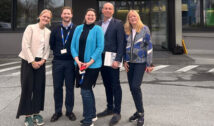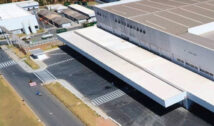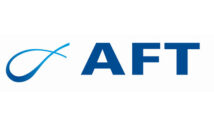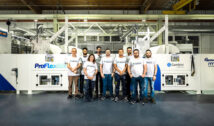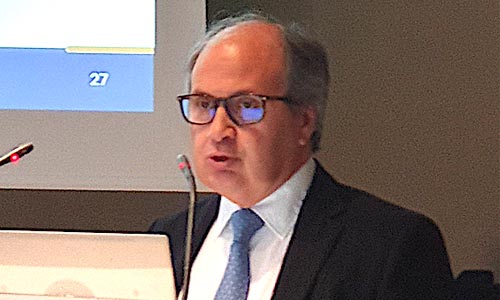
This morning, Copacel, the French Union of cardboard, paper and cellulose industries, presented the results of the 2023 financial year and outlined some prospects for the current year. After a sharp fall in paper & board production last year, and despite an economic context which will remain gloomy, paper production should rebound in 2024. But the sector is calling for a reorientation of community policies on the occasion of the European elections, in order to further promote the competitiveness of industries.
The key elements noted by Copacel.
15% drop in apparent consumption (7.1 Mt), 13.5% in paper & board production (6.1 Mt) and 26% in turnover (€5.6 billion)
2022 that laughs, 2023 that cries. In 2022, despite the unprecedented rise in raw material and energy costs, and their impact on the selling prices of paper and board, paper activity was sustained. This atypical year was followed, in 2023, by an equally unique year, but for opposite reasons. The slowdown in orders, observed at the end of 2022, has in fact increased to an unprecedented extent. The very significant decline in French apparent consumption of paper & board (-15% to 7.1 Mt) led to a drop in production (-13.5% to 6.1 Mt) and a sharp contraction in companies’ turnover (-26% to €5.6 billion). This drop in production, close to that observed in Europe (-12.8% in tonnage), is the result of several causes. On the one hand, continued inflationary pressures weighed on household consumption (packaging, subscriptions, etc.). On the other hand, the low growth in GDP (0.9% in France in 2023) was not very favorable to the use of paper products by companies (decline in trade, advertising, commercial letters, etc.). Furthermore, due to their low activity, many companies in client sectors have prioritized using stocks built up in 2022, thus accentuating the drop in orders. Finally, the industrial tool continued to evolve, in order to increase the production capacity of packaging paper & board and reduce that of graphic papers. The balance between new capacities and closures is however negative, an additional explanation for the drop in production in 2023.
Energy costs have returned to reason, but their levels pose a problem for the competitiveness of the sector
After the peaks reached in 2022, the market prices of gas and electricity have largely calmed down. In 2023, the average prices of gas and electricity have thus fallen by around 60% compared to 2022 levels. These developments, which have had a positive impact on the production costs of paper mills, are however worrying because energy prices remain above their historical levels, while demand from industries (all sectors combined) is low. The replacement of Russian gas with LNG has ushered Europe into an era of expensive energy. A situation that is all the more worrying given that the functioning of the European electricity market reflects the price of gas (even when the means of production use this energy source only slightly).
A resumption of activity should be confirmed in 2024, but this optimism remains cautious
Even if GDP growth will remain tenuous in 2024, in France and its main partners, several factors encourage Copacel officials to “cautious optimism”. On the macroeconomic level, the decline in inflation and the fall in interest rates should boost household consumption and business investment. Furthermore, the absorption of stocks in customer sectors should enable the increase in final demand to translate into orders sent to paper companies. Finally, the persistence of underlying trends will be likely to improve consumers’ appetite for paper and board products, whether it be the development of online commerce or consumers’ attraction to a recyclable and biodegradable material. Finally, the continued implementation of different texts will have a mixed impact: positive when it comes to replacing plastic packaging but negative when an experiment like “Oui-Pub” (i.e. “Yes to Advertising”) accelerates the movement of advertisers towards digital communication.
In a year marked by the European elections, community policies must further promote the competitiveness of industries
In an uncertain economic context, Copacel points out that the expected improvement must however be reinforced by various measures. First of all, in order to achieve very ambitious objectives in terms of decarbonization and efficiency in the use of water, public authorities will have to strengthen their support systems. Likewise, the ongoing discussions concerning the regulation of the electricity market from January 1, 2026 must lead to a better designed system than that unveiled at the end of 2023, otherwise paper companies risk losing the competitive advantage represented by the existence in France of a nuclear park.
“In addition to the measures that will be adopted within a national framework, we expect a lot from a reorientation of community policy,” concluded Christian Ribeyrolle (photo), president of Copacel and vice-president “Biomaterials & New Products Development” at RYAM as well as president from RYAM France. Many texts adopted within the framework of the European Green Deal will act in practice as so many unfavorable ferments for the activity of our industry. The draft Regulation on packaging and that on deforestation are two examples of texts marked by ideology, poorly designed and not based on real impact studies. It will be up to the next European Commission and the next Parliament to re-examine the most problematic texts, in order to put community policy back on track.”
V.L
Copacel brings together 70 companies producing pulp, paper and cellulose which employ nearly 11,000 people.



